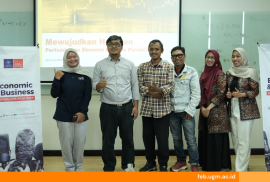In the framework of the 65th Anniversary (Lustrum XII), the Faculty of Economics and Business UGM in collaboration with the Faculty of Medicine, Public Health and Nursing UGM held a seminar with the theme of Work-life Balance in the Pandemic Situation. The seminar was held through two platforms, namely Cisco Webex and live streaming on Fakultas Ekonomika dan Bisnis UGM YouTube channel, and was attended by students, lecturers, educational staff, and the public participant. The seminar was guided by a moderator, Amanda Acintya, SE., M.Sc. The resource person for this seminar is Prof. Dra. R.A. Yayi Suryo Prabandari, M.Sc., Ph.D. as Professor of FKKMK UGM.
Bringing topics about Work Life Balance, this lecturer at the Department of Health Behavioral, Environmental, and Social Medicine FKKMK UGM started the discussion by defining the meaning of health according to the World Health Organization (WHO). “Health is a state of well-being, be it physical, mental or social. So it is not only free from disease and disability,” she said. She added that being healthy is not only not getting sick, but being able to go to school, work, carry out daily activities smoothly, feel calm and happy, be ready to cooperate with other people or participate in social activities are also part of being healthy itself.
In order to develop a healthy ecosystem, according to her, it is important that the university creates a Healthy University environment. She quoted the Healthy Universities Network England as saying that it is important to take a comprehensive health approach to universities to create a learning environment that improves the health, well-being and sustainability of their communities. Because, this can encourage people to reach their full potential. This can be realized with the commitment and policies of university leaders, a physical and social environment that supports healthy behavior, and educational activities and research on health.
Prof. Yayi explained that Universitas Gadjah Mada, has committed to the development of a Healthy University, this effort is carried out through the theme Health Promoting University (HPU) which issues efforts towards well being. Among them are physical activity, healthy diet, mental health, health literacy, zero tolerance for drugs, tobacco and alcohol, zero tolerance for violence, bullying and harassment, as well as the formation of a healthy, safe and disabled friendly environment.
Regarding the current Covid-19 Pandemic, she revealed that many problems occurred, especially in terms of information dissemination. The amount of information related to a special topic that develops often occurs in a short time and consecutively when responding to a special event. In this situation, there is often misinformation, a lot of rumors and manipulation of information with the intention of making people doubt.
“Apart from a pandemic, we are actually also facing an infodemic. The number of issues, and information often makes us doubt. That’s why technology and news can be good, on the other hand it can also be like a virus, ”she explained.
“We must be able to relax, stop for a moment from social media, from information that makes us nervous, stop negative news,” she added.
Mental health threats also need to be taken seriously, especially in the last few months, many changes have occurred during the pandemic, such as policies for work from home and physical distancing. According to him, this can make a person stressed, even depressed. Both can be caused by feelings of pressure, anxiety, tension, and responses that require individuals to make adjustments.
Prof. Yayi gave effective tips to achieve work life balance. From a physical point of view, leave the urge to always want to be perfect, take off the technology for a moment, and use it for exercise and meditation or prayer. Change the structure of life, change the new atmosphere by limiting activities and social activities that only waste time.
“The main thing is we set the schedule, not the schedule regulates us”, she explained.
From a mental perspective, the key to work life balance is being grateful. According to her, the components that determine gratitude include always trying to do good deeds to others, good intentions aimed at someone or something, and always acting positively through positive assessment and appreciation of others for what is obtained.
“Gratitude acts as a feeling of grateful, is pleasant in response to self-acceptance to what we obtained,” she said.
If it can be implemented, a person’s tendency to be accepted by his social environment (prosociality), react emotionally and feel satisfaction in his life (Emotionality well-being), and which is related to religion, faith, and regarding transcendental values related to vertical relationships with God (spirituality) will be optimal and Work-life Balance will always be reached wherever our situation is.
Translator: Laras OIA




